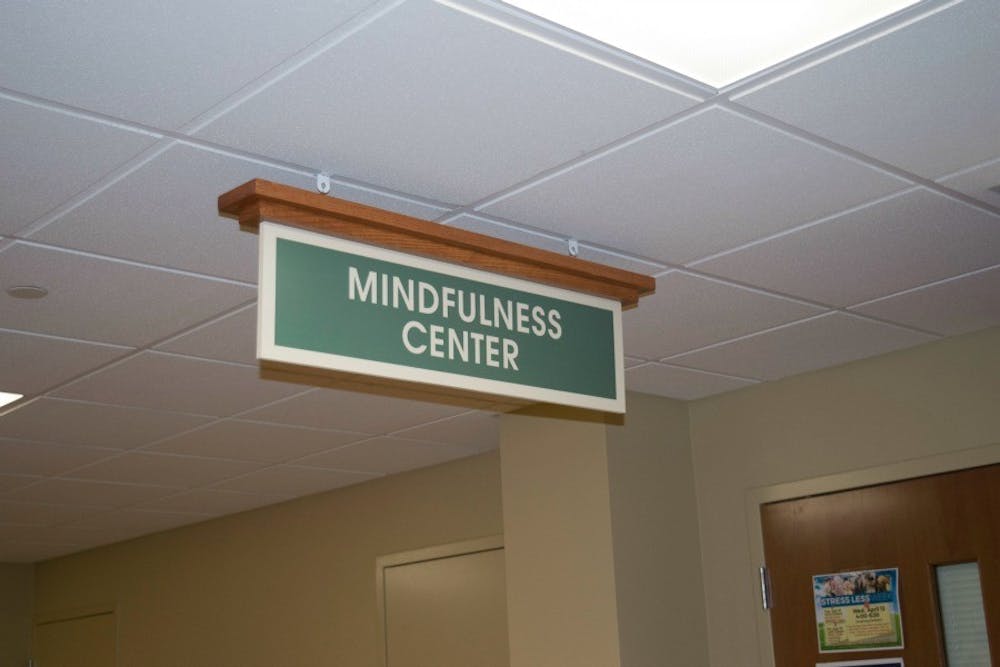By Laura Fitzgerald, Senior Staff Writer
The official opening of the Mindfulness and Contemplative Inquiry Center and the creation of the Miami Yoga and Mindfulness Club have given students new opportunities to experience the benefits of yoga and mindfulness practices.
The Mindfulness and Contemplative Inquiry Center was approved in 2014 by the university and received its space in McGuffey in fall 2015, said Suzanne Klatt, clinical faculty director of the center. While it has been holding events and sessions, it officially opened on March 31, 2016.
Mindfulness is being fully present in the moment and dedicating all thoughts and attention to that task. This differs from meditation in that mindfulness is a way of life and can be practiced while doing any task. Mediation is a practice that requires the participant to set aside time to do it.
Sophomores Claudia Read and Walter Pappas started the Miami Yoga and Mindfulness club this semester. They are partnering with other similar organizations, such as the Uptown yoga studio Root Yoga, to host yoga sessions. Read and Pappas plan to raise awareness about yoga and mindfulness with meditation sessions and educational events.
Klatt said mindfulness is an ancient practice with origins in Buddhism. However, it has only gained popularity in recent years in healthcare and university programs across the country. Many universities are now incorporating programs in mindfulness practices, such as The Ohio State University which has incorporated mindfulness therapy into its psychological services.
"It's actually a very old practice, but the way in which it has been developed and utilized in health care settings, education and the workplace is new," Klatt said.
Pappas mediates and practices yoga every day, while Read practices yoga every day and mediates as often as she can. Pappas said practicing mindfulness and meditation reduces chronic stress, which has negative health effects ranging from insomnia to anxiety and depression.
"Stress is one of the most detrimental things we can do to our body and our mind," Pappas said.
Practicing mindfulness and meditation also improves attention, which helps busy students by allowing them to focus on and complete homework, Pappas said.
"Attention is such an important art of getting things done and being successful," Pappas said.
Pappas said a large part of mindfulness is withholding judgement of thoughts. That means experiencing thoughts and emotions and not immediately associating them as "good" or "bad" thoughts. This helps give students gain emotional control over their lives by not allowing situations to affect their mood.
Mindfulness is especially important today as there are many distractions around us that command our attention, Pappas said. Technology such as phones and computers offer distractions that can prevent people from being fully present in the moment.
Both Pappas and Read experienced Attention Deficit Disorder (ADD), but practicing mindfulness has helped them focus and overcome it. Read said she disliked taking medication, and meditating and yoga have helped her get off medication for ADD.
Read said she enjoys the feeling she experiences from mediation and yoga because it helps reduce her anxiety and put her in a better mood.
"Every time I practice yoga I leave with such a calm mentality," Read said. "I love the feeling I get from it and how it affects my attitude because I leave so happy."
This semester, the Center for Contemplative Inquiry and Mindfulness Practices offered two courses, EHS 401/501, a three credit hour class on meaning and mindfulness in education, health and work and EHS 422/522, a one credit hour mediation lab. The center also periodically hosts speakers, events and mediation times open to students.

